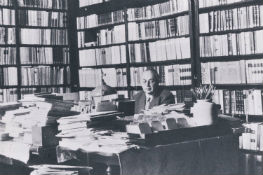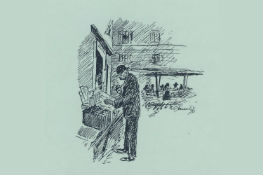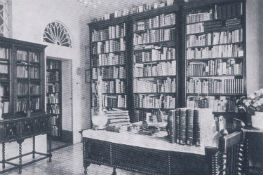Versione italiana English version Version française Versión en español
Index First editions Manzoni's collections Bibliophile's works Letters and photographs
"Bibliophile with a joyful heart exploring the house of grandparents", "Born in 1900 with eyes turned back": in the 1950s Italian magazines described, with these catchy terms, the bibliographer, bibliologist, publisher and essayist Marino Parenti (Asola 1900 - Florence 1963), at the time known to the general public for the radio column "L'Approdo dei bibliofili". It was also a way to forget the rigid but also generous official already right arm of Giovanni Gentile, active in the times of fascism to the propaganda of the Italian book abroad, the creation of the Italian Encyclopedia and then as the first director of the Manzonian Centre in the Manzoni House in Milan. In the Florentine years of Parenti (1948-1963) as director of Sansoni, his reputation as a bibliographer grew in parallel with his reputation as a skilled collector of bibliographical rarities; his personal library was the subject of journalistic articles that emphasized its peculiarity, but also its uniqueness. Centered on a nucleus rather consisting of works made unique by some particularities, often not evident, the collection reflected first of all the cultural interests of the owner, with the attention paid in great part to the literary 19th century, and in particular to the figure of Alessandro Manzoni.
His habit with the nineteenth-century editions was capillary, deep, and also revealed an instinct almost divination in identifying trouvailles of value. Great frequenter of stalls and antique bookstores, bookseller antiquarian himself in the Roman years, his library reflects the interests and choices of a lifetime, but also reveals, in the core of the bibliographical rarities (in the collection Parenti identificate con la sigla Rari Parenti), a precise project, which merged into the publication of the bibliographic work in several volumes Rarità bibliografiche dell'Ottocento. The rest of the library reflects above all the working materials of an avid compiler of bibliographies, but also of an executive to whom the publishing house Sansoni, managed by the sons of Giovanni Gentile, had assigned an independent sector, the Sansoni Antique, with the collection Italic bibliographical library. A separate discourse is represented by the brochures, collected by thousands, very useful for minute research on the literary nineteenth century, by Parenti explored in the most hidden implications, with volumes and articles compiled in pen tip, with wit and apparent lightness.
It was Luigi Firpo, friend of Marino Parenti and collaborator of the Bibliographic Library, who worried about the fate of the Parenti library, after the death of the great bibliophile, preventing its dispersion with a proposal for purchase to the Province of Turin, received not without initial difficulties. In 1966, the Provincial Administration, now Metropolitan City, purchased the library and other holdings that belonged to Parenti. Composed of about 12,000 pieces including volumes and brochures, the Bibliographic Fund "Parenti" is a mine of information, curiosities and rarities for historical, literary, philological, typographic-editorial research of the nineteenth century. Exceptional is the collection of first editions made precious by unique specimens that bear the autograph dedications of Manzoni (of which there is also the edition of Promessi Sposi called Ventisettana), Foscolo, Leopardi, Pellico, Carducci, Giusti, Tommaseo, Collodi, Pascoli, Verga, Dino Campana (with a copy of the first edition of Canti orfici raped by the author), and much more.
Together with the personal archive, the photographic collection, the epistolary and the autographic collection, the Parenti library forms one of the highest quality nuclei of the Library of History and Culture of Piedmont "G. Grosso"in a perspective that far exceeds regional limits.



